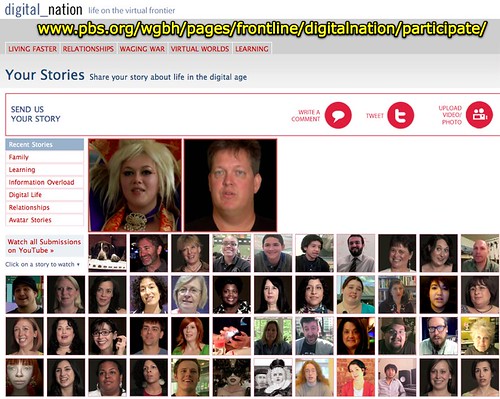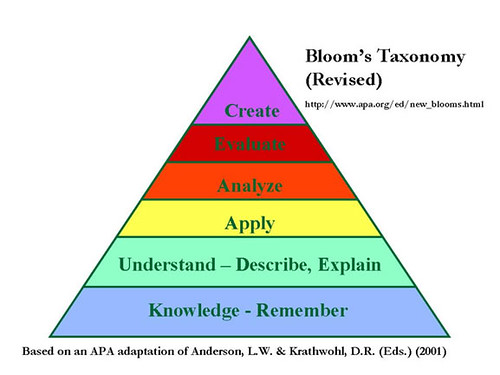This week in the “digital dialog” class I’m leading for local parents and grandparents here in Edmond, Oklahoma, we’re going to watch and discuss the 2007 PBS Frontline special “Growing Up Online.” The entire program remains online to watch for free, and provides a good overview of many digital issues which continue to confront our families, communities and schools. Many of the issues the film raises are parenting and adolescence issues, not strictly “technology” issues. Technology is in many cases the AMPLIFIER of different challenges and situations, rather than the “cause” or source. In our class we’re going to use some of the questions from the teacher study/discussion guide to explore many of these topics in our 1.5 hour class together Wednesday night.
PBS is in the midst of creating a follow-up program to “Growing Up Online” called “Digital Nation: Life on the Virtual Frontier.” The website invites people around the world to send in their stories about life online and their digital experiences.
Videos have been and continue to be submitted by viewers via YouTube and tagged “dig_nat” for aggregation. PBS is publishing interview segments via their YouTube channel in advance of the final relese of Digital Nation. This short story (1.5 minutes) from Rebecca Self reflects the kind of amazing, connected tales of romance and relationships which are now possible online, and can counterbalance some of the over-the-top predator danger programs we’ve seen and heard frequently in mainstream media channels the past few years.
In the website section titled, “Living Faster: Daily life in the age of nonstop connection,” Mark Prensky and others offer perspectives on students living connected lives. Here is a 4.5 minute clip from Mark Bauerlein, author of “The Dumbest Generation: How the Digital Age Stupefies Young Americans and Jeopardizes Our Future (Or, Don’t Trust Anyone Under 30)” talking about students as “digital natives” and addressing the question, “Are They as Savvy as They Seem?” Mark argues we need “more and better web/screen activities” for young people.
I am concerned that mainstream media advocacy like this, simply for “more digital activities” for students without a pedagogic foundation in constructivist PBL, may not ultimately result in digital learning outcomes we need in our schools and society. We do NOT simply need to provide students with “more digital activities.” We need to restructure the expectations and tasks within schools so students are not simply consuming digital versions of 20th century course materials, but rather becoming active content creators and collaborators demonstrating compentency in higher order thinking all along the 2001 revision of Bloom’s taxonomy.
“Digital Nation” is scheduled for broadcast by PBS in Winter 2010. It is fantastic that program producers are publishing program segments in advance and soliciting participation from anyone. I may submit a video at some point this fall, discussing my own concerns and perspectives about digital engagement and “shifting” our schools to a CCC model. Perhaps you and your students should consider submitting video contributions as well?
Technorati Tags:
digital, kids, safety, students, life, pbs, nation, digitalnation, dig_nat, growing, isafety
If you enjoyed this post and found it useful, subscribe to Wes’ free newsletter. Check out Wes’ video tutorial library, “Playing with Media.” Information about more ways to learn with Dr. Wesley Fryer are available on wesfryer.com/after.
On this day..
- Reflections on AI, China-U.S. Relations, Education & Innovation – 2020
- Your Seminary Needs Digital and Media Literacy Instruction – 2019
- How Microsoft is Poised to Destroy MinecraftEDU – 2016
- Managing WordPress Installations in CPANEL (Monday Sept 28th) – 2015
- Don’t Equate Competency With Identity – 2014
- First iPad Digital Story with Hokusai and iMovie for iPad – 2012
- Google UK Employees talk about Family Internet Safety – 2010
- Join the K12Online08 flashback and K12Online09 preview – LIVE this Saturday on EdTechTalk! – 2009
- Help needed with WordPress plugin theme file syntax – 2009
- COV project website updates and a group for Oklahoma TitleIID winning districts – 2008



Comments
One response to “Digital Nation Call for Participation – Thinking about Digital Learning Activities”
Fantastic post Wes. I will look further into the PBS online materials. Here is a revised Bloom’s Taxonomy site I feel you will really like. http://visualblooms.wikispaces.com/ IMHO, the best part of the site is his pyramid.